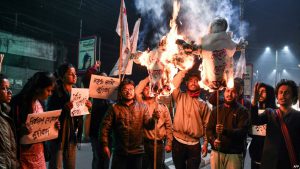NEW DELHI — India’s lower house of parliament has passed a controversial bill that proposes an easier path to citizenship to groups such as Hindus, Sikhs and Christians, but excludes Muslims who have come into the country from Bangladesh, Pakistan and Afghanistan.
Opposition parties slammed the proposed law as divisive, saying citizenship cannot be granted on the basis of religion and the bill violates the constitution, as India is a secular country.
Meanwhile, protests against the proposed legislation engulfed India’s northeast, where resentment against illegal immigration from neighboring Bangladesh runs high.
Home Minister Rajnath Singh told parliament the bill is not discriminatory and is meant for minorities that fled to India because they faced religious persecution in neighboring Muslim countries. “They have no place to go except India,” he said.
But opposition lawmakers say any changes to citizenship laws should be “religion and country neutral.” Demanding it should be a secular bill, a member of parliament from the opposition Trinamool Congress, Saugata Roy said, “Why mention only six religions? Do not mention only three countries.”
The Citizenship Amendment Bill proposes to give citizenship to Hindus, Sikhs, Jains, Buddhists, Christians and Parsis from Afghanistan, Pakistan and Bangladesh, who came to India before Dec. 31, 2014.
The fiercest opposition to the bill is in the country’s northeast, where local political parties say they want the expulsion of all entrants into the region irrespective of religion. The region witnessed a near-total shutdown on Tuesday as protesters blocked highways, clashed with police and attacked two BJP offices as the bill was being debated in parliament.
Monday, a regional party in Assam, the Asom Gana Parishad, quit Modi’s ruling National Democratic Alliance to protest the bill.
In Assam, where there has been massive resentment over losing jobs and land to outsiders, there are fears the proposed law could encourage migration of Hindus from neighboring Bangladesh. “We want all illegal migrants to be detected and deported, irrespective of their religion,” said Samujjal Bhattacharya, a protest organizer. He said citizenship rights to migrants from Bangladesh, with which Assam state shares a long open border, would threaten indigenous communities.
Minister Rajnath Singh tried to allay those concerns, saying the beneficiaries of the bill can reside in any state of the country. “The burden of those persecuted migrants will be shared by the whole country. Assam alone should not have to bear the entire burden.”
Prime Minister Narendra Modi has said his government is determined to relax rules for Hindus and other non-Muslim minorities.
Critics have called the proposed law a ploy by the ruling Bharatiya Janata Party to appease India’s majority Hindu community before national elections this year.
The bill easily passed in the lower house of parliament where the ruling BJP has a majority, but it is likely to face fierce opposition in the upper house of parliament where the ruling party is a minority.
——————————————————
From : VOA News / January 08, 2019
Link : https://www.voanews.com/a/india-lower-house-passes-citizenship-bill-despite-protests/4733560.html
![]()













